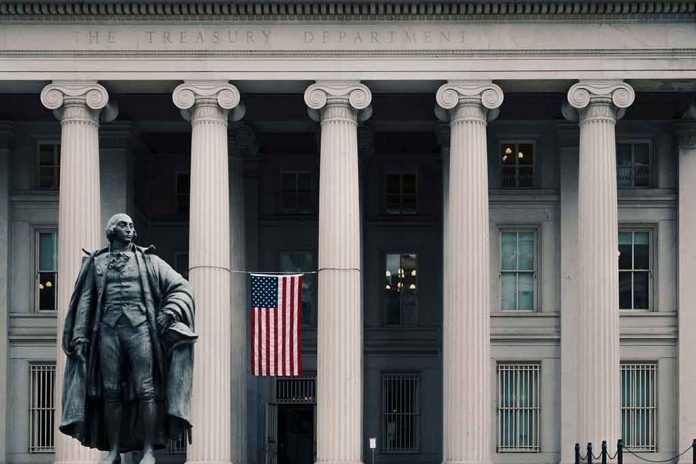
The US Treasury has launched stringent new regulations aimed at curbing money laundering through cash real estate transactions, but will these measures be enough to protect our economy?
At a Glance
- The Treasury Department issued new regulations to combat money laundering through cash purchases of residential real estate.
- Investment advisers and real estate professionals must report cash sales to legal entities, trusts, and shell companies.
- The Financial Crimes Enforcement Network (FinCEN) will administer these new rules.
- Money laundering in real estate can drive up housing costs, impacting the economy.
- The regulations aim to prevent illicit actors like drug cartels and international criminals from laundering money through real estate.
The Treasury’s New Regulations
The US Treasury Department has issued a new set of rules to combat money laundering through cash purchases of residential real estate. These measures are designed to make it harder for criminals to use real estate transactions to launder illicit funds. Investment advisers and real estate professionals will now be required to report cash sales to legal entities, trusts, and shell companies. These rules aim to close loopholes that have allowed bad actors to exploit the U.S. financial system and use real estate transactions to launder money.
The Financial Crimes Enforcement Network (FinCEN) will be responsible for administering these new regulations. According to Treasury Secretary Janet Yellen, these rules will address major regulatory deficiencies and help to combat serious crimes like corruption, narcotrafficking, and fraud. She stated, “These steps will make it harder for criminals to exploit our strong residential real estate and investment adviser sectors.”
Exemptions and Specifics
The rules will not apply to sales to individuals or purchases involving mortgages or other financing. The focus is on all-cash residential real estate purchases, which are considered high risk for money laundering activities. One reason for the prevalence of all-cash deals is that investors are purchasing a record high share of real estate. These transactions are particularly susceptible to being used for money laundering because they often lack the scrutiny associated with traditional financing mechanisms.
According to a Canadian study in 2019, money laundering in real estate increased housing prices by 3.7% to 7.5%. This not only makes housing less affordable but also distorts the market. In the U.S, the issue has grown to such an extent that a mansion in Los Angeles was seized by the Department of Justice as it was used as a bribe for an Armenian official. The new rule requires the disclosure of buyers’ identities to FinCEN to ensure transparency.
U.S. Treasury announces final anti-money laundering rules for real estate agents https://t.co/Y9sBRg2Qf0
— HousingWire (@HousingWire) August 28, 2024
Impact on the Real Estate Industry
While some real estate professionals have expressed concerns about the additional reporting requirements, the National Association of Realtors supports the rules as a pragmatic approach to combating money laundering. Treasury Secretary Janet Yellen elaborated, “The Treasury Department has been hard at work to disrupt attempts to use the United States to hide and launder ill-gotten gains.” The new regulations will require detailed reporting about buyer, seller, property details, and payment information.
The rules are a part of the Biden administration’s broader efforts to increase corporate transparency and fight dirty money in the American financial system. Executive Director Ian Gary of the FACT Coalition noted these measures represent “much-needed safeguards” in the fight against financial secrecy and criminal impunity. Additionally, these new rules will take effect on December 1, 2025, and January 1, 2026, for real estate and investment adviser sectors, respectively.
The Treasury’s new rules mark a significant effort to curb money laundering activities that have long plagued not only the American real estate sector but also the broader economy. Time will tell whether these new measures will be successful in curbing this form of financial crime and bringing more transparency to the market.
Sources
- New US rules try to make it harder for criminals to launder money by paying cash for homes
- FinCEN Issues Final Rules to Safeguard Residential Real Estate, Investment Adviser Sectors from Illicit Finance
- US Treasury Department Takes Action Against Money Laundering in Real Estate












